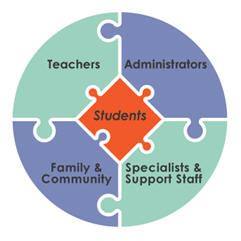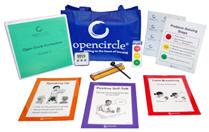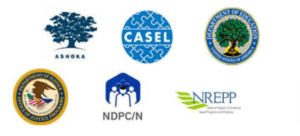
Open Circle, a program at the Wellesley Centers for Women at Wellesley College, MA, provides a unique, evidence-based social and emotional learning program (SEL) for grades K-5 aimed at:
1) proactively developing children’s skills for recognizing and managing emotions, empathy, positive relationships and problem solving, and
2) helping schools develop a community where students feel safe, cared for and engaged in learning.
Open Circle’s whole-school approach includes professional development for all adults in the school community – teachers, administrators, counselors, support staff and families – to model and reinforce pro-social skills throughout the school day and at home.
Watch an overview video: www.open-circle.org/video
Vision
We envision a world where social and emotional learning (SEL) is universally embraced and integrated into all educational communities serving youth.
Mission
To advance children’s wellbeing and learning by partnering with school communities to foster social and emotional development and caring learning environments
Core Values:
-
- Social and Emotional Learning and Development
- Learning through Relationships
- Identity and Inclusion
- Safe and Caring Environments
- Youth Leadership and Development
- Growth and Innovation
- Integration of Research, Theory, and Practice
- Collaboration and Shared Leadership

History
In 1987, Pamela Seigle founded Open Circle at the Stone Center at Wellesley College with support from Grace and Robert Stone, supporters committed to the emotional wellbeing of children. Originally named the “Framingham Schools Project” and later “Reach Out to Schools”, Open Circle was one of the first programs to define the field of SEL. Learn more about Open Circle’s history.
Today, Open Circle is used in over 300 schools across the United States and remains a leading provider of evidence-based curriculum and professional development for SEL in elementary schools, reaching more than two million children and 15,000 educators. Open Circle is a program of the Wellesley Centers for Women at Wellesley College.
Download our one-page flyer (PDF) to share with anyone who might be interested.
Activities
Research
Two research studies have demonstrated Open Circle’s positive impact on students’ skills and behavior. The first study found that after receiving one year of Open Circle instruction, both urban and suburban students demonstrated significantly greater social skills and significantly fewer problem behaviors than students in control groups. The largest gains were made by students in urban areas. The second study examined middle school students with at least two prior years of Open Circle participation and found that girls showed a significant increase in self-assertiveness and boys showed higher levels of social skill and self-control and fewer problems with physical fighting.
References:
Taylor, C. A., Liang, B., Tracy, A. J., Williams, L. M., & Seigle, P. (2002). Gender Differences in Middle School Adjustment, Physical Fighting, and Social Skills: Evaluation of a Social Competency Program. The Journal of Primary Prevention, 23(2), 259–72.
Hennessey, B. A. (2007). Promoting Social Competence in School-Aged Children: The Effects of the Open Circle Program. Journal of School Psychology, 45, 349-360.
Programming
Classroom teachers implement the grade-differentiated Open Circle Curriculum during twice-weekly, 15-minute Open Circle Meetings. Students form a circle of chairs, including an empty seat to symbolize that there is always room for another person, voice or opinion. Open Circle Meetings are also a familiar and safe setting for children to discuss important issues in their classroom, school, local community or the broader world. Curriculum lessons explicitly teach social and emotional skills and are highly interactive, incorporating large and small group discussions, role playing, community-building and mindfulness activities and practices, and high quality children’s literature. Teachers and counselors also use the Open Circle Curriculum in their work with students who require additional, targeted instruction. (See curriculum samples below under “Free materials.”)
Schools sustain and improve Open Circle practice over time by developing in-district or in-school trainers and peer coaches, and establishing SEL leadership teams that provide SEL mentoring, outcome measurement, and action planning.
Professional Development
Open Circle provides a whole-school approach with specialized professional development programs tailored to the unique needs of different staff roles in a school community. 
Teachers discover and practice facilitation skills, learn to proactively teach SEL skills using the Open Circle Curriculum, and explore ways to integrate Open Circle skills, concepts and vocabulary throughout the school day.
Counselors learn to leverage the Open Circle Curriculum in targeted work with groups or individual students, to employ SEL assessment tools, and to lead a five-session workshop that helps families reinforce Open Circle concepts and integrate them into effective parenting techniques.
Administrators develop strategies for encouraging consistent and effective Open Circle implementation, learn to employ assessment tools for monitoring SEL progress and tracking SEL outcomes, and learn techniques for incorporating Open Circle approaches into their own interaction with students, staff and parents.
Specialists and support staff learn key Open Circle approaches and vocabulary and create practical applications of Open Circle tools for their work.
Families are engaged through Open Circle workshops and letters introducing the Open Circle Curriculum and key vocabulary (available in eight languages).
While Open Circle recommends a whole school approach, it provides professional development options for individuals or groups of educators in the summer or after school. Details for professional development opportunities including trainings and costs are found in the Catalog of Programs.

Audiences Served
320 schools in more than 100 communities are using Open Circle to teach children essential SEL skills and create safe, caring and highly-engaging learning environments.

Impact
Two research studies have demonstrated Open Circle’s positive impact on students’ skills and behavior. The first study found that after receiving one year of Open Circle instruction, both urban and suburban students demonstrated significantly greater social skills and significantly fewer problem behaviors than students in control groups. The largest gains were made by students in urban areas. The second study examined middle school students with at least two prior years of Open Circle participation and found that girls showed a significant increase in self-assertiveness and boys showed higher levels of social skill and self-control and fewer problems with physical fighting. Key results from a June 2013 survey of 460 Open Circle teachers are represented below.
Free Resource
- Lists of children’s books that connect to SEL:
- https://www.open-circle.org/resources/recommended-books
- Open Circle Curriculum sample Table of Contents (Grade 5) (https://www.open-circle.org/images/pdf/OpenCircleCurriculumContentsGrade5.pdf)
- Sample lessons:
Kindergarten: Being Calm
Grade 2: Cooperating
Grade 4: Positive Self–Talk
Gratitude Curriculum Component (developed in 2016 through a grant from the Greater Good Science Center)
Recognitions
Open Circle is included on several national lists for its evidence of effectiveness in increasing students’ demonstration of pro-social skills, decreasing violence and other problem behaviors, and supporting an easier transition to middle school. We are recognized by the following organizations:

Recommendations for Replication or Adaptation
In order to implement the program successfully, professional development is required. Schools sustain and improve SEL capacity over time by developing Open Circle trainers, coaches and leadership teams, providing training, mentorship, outcome measurement and action planning.
While we allow training individual educators, we recommend a whole school approach that fosters continuity of skills as children progress throughout the grades.
Contact Info
Website: open-circle.org
Phone: 781-283-3277
Email: info@open-circle.org
Contact name: Kamilah Drummond-Forrester, Director
